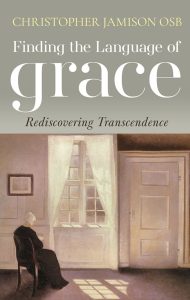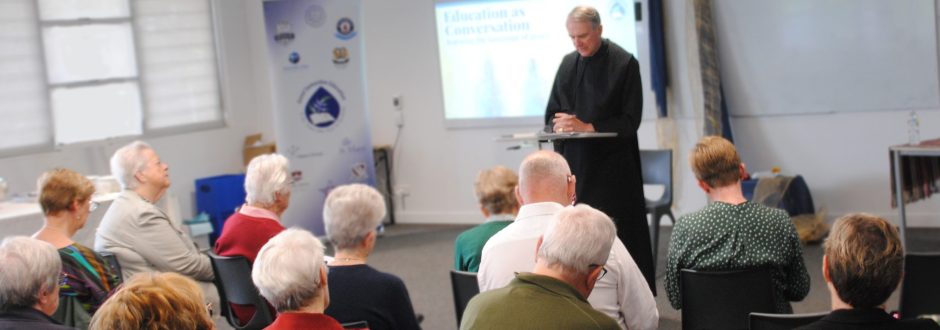Good Samaritan Education recently hosted well-known Benedictine author, speaker, educator and broadcaster, Abbot Christopher Jamison OSB, in Sydney for a presentation exploring some of the themes of his new book about grace, language, and how the two play a key role in both education and public and private discourse today.
The book, published by Bloomsbury, is entitled Finding the Language of Grace: Rediscovering Transcendence.
Abbot Christopher is Australian by birth but moved to England as a child. After graduating from the University of Cambridge he joined the Benedictine Monastery in Worth and later became Abbot. He is currently the President of the English Benedictine Conference.
He came to prominence some years ago, when he was Abbot of the Worth Monastery and featured in the BBC television series The Monastery, which was watched by millions. He wrote a bestselling book shortly thereafter with the title Finding Sanctuary: Monastic Steps for Everyday Life.
In his new book, Abbot Christopher the force of grace in our lives, in our souls and in our minds, offering a unique perspective on healing the loneliness and sorrow experienced by many today, and a different way of addressing the turbulence and political extremes of the world.

Abbot Christopher Jamieson OSB. Image: Good Samaritan Education.
Speaking at the St Scholastica Centre, Glebe, to a group of Good Samaritan Sisters, educators from Good Samaritan Education schools, and others, Abbot Christopher began by asking those present to first discuss in small groups their own experience of grace and then their understanding of the theology of grace.
Drawing on some of the themes that emerged from those discussions, that grace can be experienced as hospitality, peace, reconciliation, gift, relationship, communion and the work of the Holy Spirit among us, he then shared some of the key insights from his own research and writing.
“As a good Catholic, I went to St Thomas Aquinas. And Aquinas’ definition of grace is where I’d like to start. It reflects very strongly all that you have been saying,” he said.
“He talks about love. Love is his key word in his understanding of grace.
“He sees love as always coming from God and he sees this love being active in three ways. First of all, a general sense of being loved; secondly, individual acts of love which we can identify within that context of being generally loved. The third expression of grace is gratitude.
“And, of course, then it becomes circular. My gratitude then leads to a greater sense of love in general, and being loved. And then we are more aware of those individual acts of love and moments of grace, be that sacramental grace or other individual grace.”
Going back to the Book of Genesis, Abbot Christopher said an understanding of Original Sin was necessary to appreciate the action of grace, and that the story of Adam and Eve in the garden was essentially a story of mistrust.
“God trusted Adam and Eve to be in the beautiful garden, with one rule: not to eat of the tree of the knowledge of good and evil. And they could not trust God to obey his rule,” he said.
“This mistrust will now characterise humanity forever. And the rest of the story of the Bible is God continuing to show trust in humanity and humanity not trusting God.
“If we then have that picture of grace expressed in those three ways, and Original Sin as Original Mistrust, we have a basis, it seems to me, on which to find again the language of grace.”

Image: Bloomsbury.
Abbot Christopher said his book examines four key components of a language of grace: Speaking, Listening, Writing and Reading. He said each of them can be occasions of grace, of restoring trust, pursuing questions, exploring mystery, and experiencing and speaking about transcendence, something which is becoming less common, especially among young people.
“I think what I’m trying to do is I’m trying to help people find the future, let alone finding the language of grace. Because I worry that everything nowadays starts as a problem, then becomes a crisis, and ends up as an emergency,” he said.
“It’s extraordinary. It used to be a climate problem, now it’s a climate emergency. I want to say, who decided that, and where did it happen, what’s changed? And there are answers to that, like, governments aren’t doing enough and so on, but actually, the language around these problems, I find deeply problematic.
“If you tell me there’s an emergency, I panic. Now, I have never known a situation which is improved by everybody panicking. Don’t tell me it’s an emergency. Tell me it’s a problem and then I can work on it.
“And I worry again, that that younger generation has been persuaded that life is now an emergency – the whole of life is now an emergency. Race is an emergency, climate is an emergency, transgender is an emergency – everything is an emergency and we’re all in a panic.
“I don’t think this is healthy and I think it’s one of the reasons why there are so many mental health problems among the younger generation.
“I don’t want to deny that there are problems, so I don’t want to be utopian about it … but equally I don’t want to buy into the language of climate emergency. You can use it, but I’m not going to use it because I don’t think it helps me solve the climate problem.”
There was a similar use of emergency-style language around other social issues such as race and transgender, all of which was being accelerated by the use of social media, he said.
“What I try to do (in the book) is say we’ve got to reimagine our language around these issues because then we might find a meeting place of all the different views from which we can move forward.”
Abbot Christopher Jamison OSB’s new book, Finding the Language of Grace: Rediscovering Transcendence, is published by Bloomsbury.
To watch a video of Abbot Christopher’s presentation, click here.
